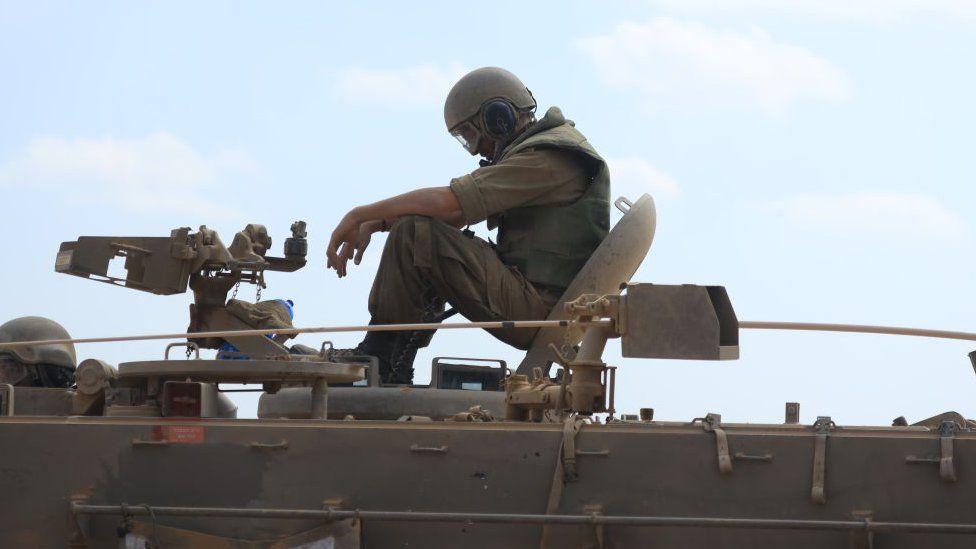-

-
-
Loading

Loading

Israel's leaders have stated their intention to completely eliminate Hamas and ensure that Gaza never returns to its previous state. Prime Minister Benjamin Netanyahu declared that every Hamas member is a target after the group killed 1,300 people in an attack on Israel. Operation Swords of Iron, the military's mission, is seen as more ambitious than any previous operation in Gaza. However, the question remains: Can this mission be realistically achieved? A ground invasion of Gaza would involve intense urban combat and put the civilian population at great risk. Air strikes have already caused numerous casualties and displaced over 400,000 people. Additionally, the military has the added challenge of rescuing at least 150 hostages held at unknown locations in Gaza. Herzi Halevi, the chief of staff of the Israel Defense Forces (IDF), has vowed to dismantle Hamas, particularly targeting its political leader in Gaza. However, after 16 years of Hamas's violent rule, there is no clear vision for how Gaza will look after their removal. Military analyst Amir Bar Shalom believes that while it may be impossible to dismantle every Hamas member due to the extremist nature of their ideology, weakening the group to the point where they have no operational capabilities is a more realistic objective. Israel has engaged in four wars with Hamas in the past, all of which failed to halt their rocket attacks. Lieutenant Colonel Jonathan Conricus, a spokesman for the IDF, stated that their objective in this war is to eliminate Hamas's military capacity to target Israeli civilians. However, the success of the operation is reliant on several factors that could potentially derail it. Hamas's armed wing, the Izzedine al-Qassam Brigades, is likely well-prepared for an Israeli offensive, with explosives and ambushes already planned. The extensive tunnel network of Hamas could also be used to launch attacks on Israeli forces. In the previous conflict in 2014, Israeli soldiers suffered heavy losses from various tactics employed by Hamas. To mitigate these risks, Israel has demanded the evacuation of 1.1 million Palestinians from the northern area of the Gaza Strip. The war may extend for months, as indicated by the record number of reservists reporting for duty. The question remains as to how long Israel can sustain the campaign without significant international pressure to cease. Gaza is quickly deteriorating, with the UN's refugee agency warning of worsening living conditions, increasing casualties, and dwindling essential supplies. Yossi Melman, a prominent security and intelligence journalist, believes that while Israel currently feels supported by Western leaders, it may face intervention if the international community witnesses the Gaza population suffering. Considerable international stakes are involved in this operation, as there are numerous hostages who hold citizenship from various countries. Several governments, including the US, France, and the UK, are invested in their safe release. French President Emmanuel Macron has made promises to bring French-Israeli families back home, emphasizing that France will not abandon its citizens. The fate of the hostages is unclear in terms of its influence on military planning. However, Israel is facing pressure from both domestic and international sources. Amir Bar Shalom draws a parallel between this situation and the 1972 Munich Olympics massacre, where Israel pursued those responsible for the attack. He believes the Israeli government will seek to apprehend all individuals involved in the kidnappings. The challenge of rescuing multiple hostages held in different areas of Gaza may prove overwhelming for Israel's elite Sayeret Matkal unit. Hamas has already threatened to harm hostages as a deterrent to an Israeli assault. After a prisoner exchange in 2011, where Israel released over 1,000 prisoners for the release of a kidnapped soldier, the country may be hesitant to agree to another such release due to the subsequent rise of Yahya Sinwar, now Hamas's political leader in Gaza. Israel's neighbors also play a significant role in the duration and outcome of a ground offensive. Egypt, sharing a border with Gaza, is likely to face pressure due to the suffering of Gazans. However, it is unlikely that Egypt would open its borders to a mass influx of Gazans or engage in military action against Israel on their behalf. Israel's northern border with Lebanon is also under scrutiny, although cross-border attacks by Hezbollah have not escalated into a full-scale conflict. Iran, Hezbollah's main supporter, has stated its intention to create new fronts against Israel. US President Joe Biden has warned against taking advantage of the situation, reinforcing the message by deploying an aircraft carrier to the Eastern Mediterranean. If Hamas were significantly weakened, the question arises as to who would fill the resultant power vacuum. Since withdrawing its army and settlers from the Gaza Strip in 2005, Israel has no intention of returning as an occupying force. Ofir Winter believes that this could offer an opportunity for the gradual return of the Palestinian Authority, which currently controls parts of the West Bank. Rebuilding Gaza's devastated infrastructure, including addressing its limited access to dual-use goods, will be crucial. Calls for a buffer zone along the fence to protect Israeli communities have also been made. Yoram Cohen, a former head of Shin Bet, suggests that a 2km (1.25-mile) "shoot-on-sight" zone may be necessary. Ultimately, regardless of the war's outcome, Israel aims to prevent similar attacks in the future.